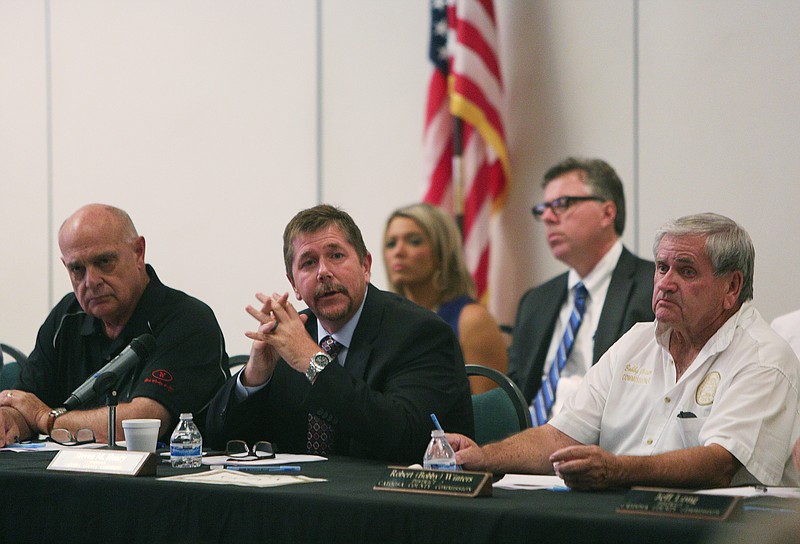Putting itself in the middle of a fight between two major health care providers, the Catoosa County Commission plans to dispute Erlanger Health System's claim to a surgery center in Ringgold, Ga.
After a unanimous vote by the elected officials two weeks ago, Commission Chairman Steve Henry filed a letter of opposition against Erlanger's application to build the center. The operation would be located off Battlefield Parkway, about a half mile west of where CHI Memorial Hospital is trying to launch its own surgery center.
Henry declined to comment on the decision this week. County Attorney Chad Young said Erlanger executives requested a meeting with members of the local government, but they have not set a date for the private get-together.
In an odd twist, Young argued that opposing Erlanger's plan keeps the county's options open. Sunday was the deadline to file any formal objection. The Georgia Department of Community Health will next schedule a hearing on the issue, though they have not yet set a date.
The county commission can withdraw its objection before then. Two other groups have filed against Erlanger: CHI Memorial and Hamilton Medical Center, of Dalton, Ga. Hamilton Medical Center CEO Jeff Myers said he isn't sure if the hospital will follow through on its objection.
The letter of opposition is a fill-out-the-blank document, with no room for specific complaints. But Young said the county commission objects to Erlanger creating a zero-sum game for a surgery center on Battlefield Parkway.
In the hospital's application to open a surgery center, Erlanger Senior Vice President of Planning and Business Development Joe Winick wrote that CHI Memorial doesn't currently have the standing to start its own operation. Young said the commissioners don't like that Erlanger is trying to block another hospital.
"They've made it a mutually exclusive proposition," Young said. "To support one, we have to oppose what another is trying to do."
Erlanger Spokeswoman Pat Charles said that, in reality, the Department of Community Health will choose one hospital or the other, not both.
"While we do not understand why Catoosa County has elected to oppose Erlanger' s application to provide health care services there," she said in a statement, "we very much respect the Board of Commissioners and its representatives."
To open a surgery center, a hospital must get a certificate of need from the Department of Community Health.
CHI Memorial purchased Hutcheson Medical Center's abandoned surgery building for $4.5 million on Nov. 15. In theory, CHI Memorial may have inherited the old certificate of need with the purchase. CHI Memorial is currently renovating the inside of the building.
Erlanger, meanwhile, applied for a certificate of need for its own surgery center across the street Nov. 29. In the application, Winick wrote that CHI Memorial's potential certificate of need from the old Hutcheson building lapsed. Why? Because no doctors have worked there since 2015, when a trustee running Hutcheson's bankrupt operations shuttered it.
And because that certificate of need lapsed, Winick wrote, Erlanger should now be able to stake its claim.
It's not clear what arguments CHI Memorial will make in this case. But CEO Larry Schumacher told the Times Free Press in November that the hospital invested about $18 million in North Georgia when it bought the Battlefield Parkway building and Cornerstone Medical Center.
And while Erlanger is arguing that Hutcheson's old certificate of need is dead, CHI Memorial plans to file a request for a new certificate. Vice President of Marketing and Communications Lisa McCluskey said in a statement Wednesday that the hospital will request one to perform Non-Special MegaVoltage Radiation Therapy Services.
While groups opposing Erlanger's plan can withdraw their complaints, Catoosa County Commissioner Bobby Winters does not think he will have second thoughts.
"We ain't gonna let Erlanger come," he said this week.
He said CHI Memorial's purchases in North Georgia in November show they're committed to the community. Winters is also sore about Erlanger's 2011 partnership with Hutcheson.
At the time, Erlanger loaned Hutcheson $20 million, and Catoosa County guaranteed half that loan. When the deal went belly up and Hutcheson sold its campus, the debt fell to $8.7 million. Ultimately, the county commission and the hospital reached a settlement, with Erlanger officials giving the local government a $2.5 million discount.
Still, Winters mentioned this week a conspiracy theory about the Erlanger-Hutcheson arrangement that former Walker County Commissioner Bebe Heiskell used to proffer: Erlanger was secretly trying to kill Hutcheson during those years, siphoning North Georgia patients to the Chattanooga hospital.
"People were going to Hutcheson here, and Erlanger was sending them to Erlanger in Chattanooga," he said. "It was a mess."
The hospital data from those years (2011-13) do not clearly back up that conspiracy theory.
On one hand, more patients from Catoosa and Walker counties started going to Erlanger's downtown campus. In 2010, according to Tennessee Department of Health Joint Annual Reports, 2,146 patients from the two counties went there. From 2011-13, the number was up to 2,823 patients a year, a 31-percent increase.
But at the same time, according to Georgia Department of Community Health Hospital questionnaires, fewer patients were transferred from Hutcheson's ER during the Erlanger years. In 2010, Hutcheson transferred 1,160 patients away. From 2011-13, it transferred an average of 993 patients a year - including 590 patients in 2013.
Also, fewer patients from Catoosa and Walker counties were showing up at Hutcheson those years. In 2010, 2,938 patients from the two counties came to Hutcheson. Over the next three years, before those patients even got a chance to be transferred to Erlanger, an average of 2,635 poured in annually. That represents a 10-percent drop.
